Black pepper isn’t just a kitchen staple — it’s a scientifically recognized spice with remarkable health benefits. Black pepper supports digestion, boosts nutrient absorption, improves brain function, and helps fight inflammation according to multiple modern studies. Understanding its health potential helps you use it more purposefully in daily meals for long-term wellness.
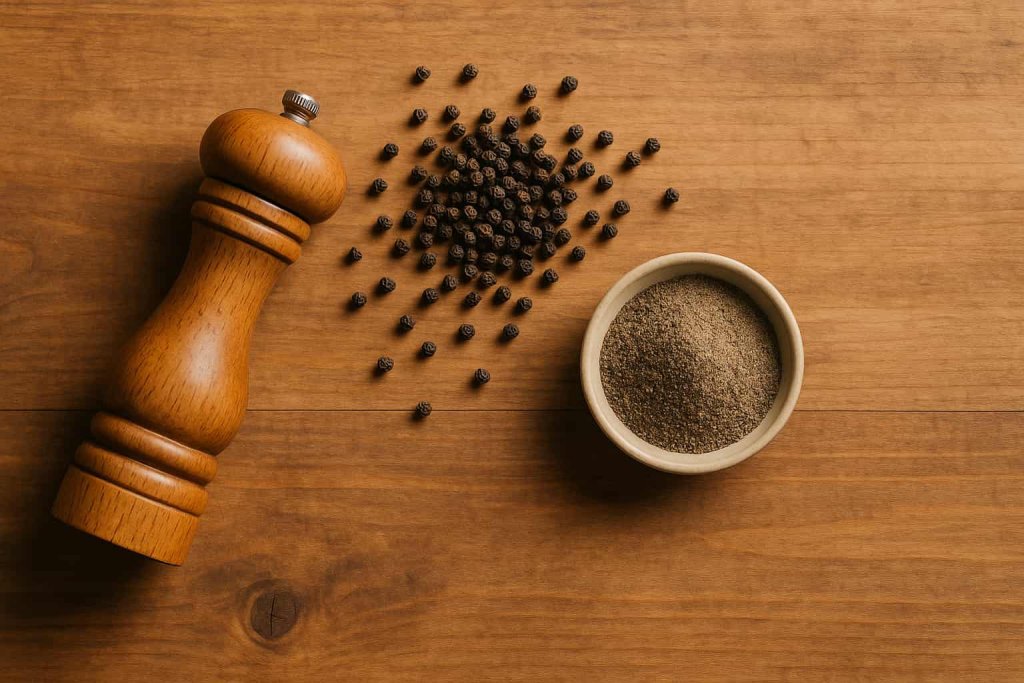
Below, we explore the top science-backed benefits of black pepper, its key nutrients, possible side effects, and how to use it safely and effectively.
What Is Black Pepper?
Black pepper (Piper nigrum) is a flowering vine native to South India, known as the “King of Spices.” The dried peppercorns are used whole or ground as seasoning. Its active compound, piperine, is responsible for both the sharp flavor and most of its medicinal properties.
For centuries, it has been used in Ayurvedic, Chinese, and modern herbal medicine for digestion, respiratory issues, and detoxification. Today, studies confirm that piperine acts as a bioenhancer, improving the absorption of nutrients and certain medications.
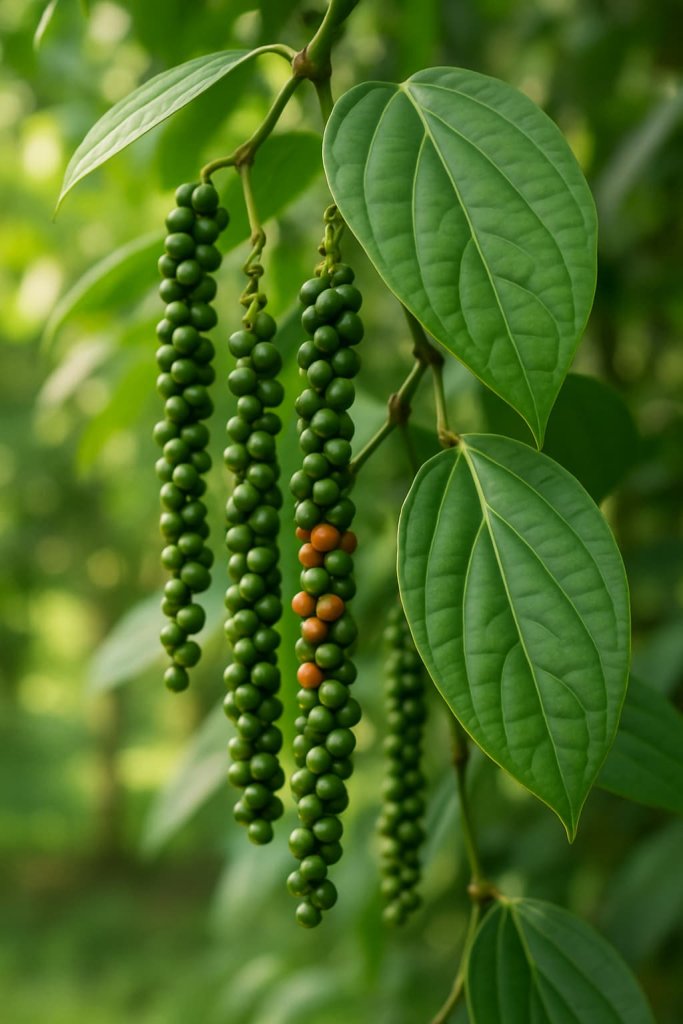
Nutritional Profile of Black Pepper
Before exploring its impressive health benefits, it’s important to understand what makes black pepper so potent nutritionally. According to the USDA FoodData Central (2025), black pepper contains a mix of essential minerals, vitamins, fiber, and phytochemicals — particularly piperine, which is the compound behind most of its medicinal effects.
Below is the approximate nutrient composition per 1 teaspoon (2.3 grams) of ground black pepper:
| Nutrient | Amount per 1 tsp (2.3 g) | % Daily Value (DV) |
|---|---|---|
| Calories | 6 kcal | — |
| Carbohydrates | 1.5 g | <1% |
| Fiber | 0.6 g | 2% |
| Protein | 0.2 g | <1% |
| Fat | 0.02 g | — |
| Manganese | 0.3 mg | 13% |
| Iron | 0.2 mg | 1% |
| Vitamin K | 3.4 µg | 3% |
| Piperine (bioactive compound) | 5–9% of dry weight | — |
Source: USDA FoodData Central (2025)
Why Piperine Is the Key Bioactive Compound
The health-promoting power of black pepper comes primarily from piperine, an alkaloid responsible for its sharp flavor and biological activity.
According to a 2024 review in Critical Reviews in Food Science and Nutrition, piperine has anti-inflammatory, antioxidant, antimicrobial, and bioavailability-enhancing effects that amplify the benefits of other nutrients and herbs — notably curcumin in turmeric.
Here’s what makes piperine so unique and essential:
- Enhances Nutrient Absorption: Increases the bioavailability of vitamins (B12, A, C) and phytonutrients (curcumin, beta-carotene, selenium).
- Boosts Digestive Efficiency: Stimulates digestive enzymes and bile acid secretion, helping break down food more effectively.
- Protects Cells from Oxidative Stress: Acts as a free radical scavenger, reducing DNA and tissue damage.
- Supports Brain Function: Improves neurotransmitter activity and protects neurons from inflammation.
As highlighted by Healthline, piperine’s ability to increase nutrient absorption by up to 2,000% is one of the main reasons black pepper is used in herbal formulations and functional foods worldwide.
10 Amazing Health Benefits of Black Pepper — Backed by Science
Black pepper isn’t just a spice — it’s a powerhouse of wellness. Backed by decades of traditional use and growing modern research, black pepper supports digestion, metabolism, heart health, and brain function through its active compound piperine. According to Healthline and Medical News Today, piperine offers antioxidant, anti-inflammatory, and bioenhancing effects that amplify nutrient absorption and overall health.
Below are ten detailed, science-backed benefits of adding this humble spice to your daily diet.
1. Improves Digestion and Gut Health
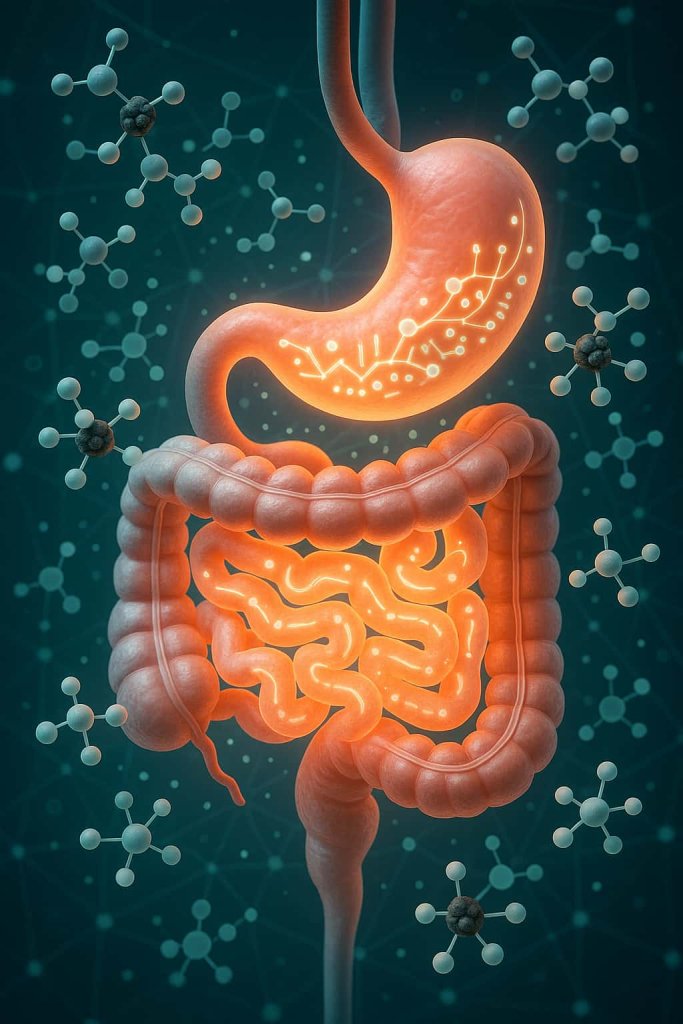
Black pepper boosts digestive health by stimulating the stomach to produce more hydrochloric acid, which helps break down food efficiently. This process prevents bloating, constipation, and indigestion.
A 2024 review in Critical Reviews in Food Science and Nutrition found that piperine enhances digestive enzyme activity and supports beneficial gut bacteria, promoting a balanced microbiome and better nutrient absorption.
Regular intake may also reduce gas formation and improve nutrient utilization from plant-based meals.
Quick tip: Add freshly ground black pepper to soups, salads, or cooked dishes for smoother digestion and less bloating.
Reference: NIH – Piperine and Digestive Enzymes
2. Enhances Nutrient Absorption

One of black pepper’s most powerful effects lies in its bioenhancing properties. Piperine improves the body’s ability to absorb nutrients like vitamin B12, beta-carotene, selenium, and particularly curcumin from turmeric.
According to a 2024 Pharmacognosy Review study, piperine can increase curcumin absorption by up to 2,000% — making turmeric and black pepper one of the most beneficial culinary pairings.
This synergy is why supplements and functional foods often include both ingredients together.
Practical example: Combine turmeric and black pepper in golden milk, soups, or curry for potent anti-inflammatory support.
Learn more: Pharmacognosy Review – Piperine’s Bioavailability Effects
3. Rich in Antioxidants

Black pepper is rich in antioxidants such as piperine, beta-caryophyllene, and phenolic compounds that protect cells from oxidative stress.
A 2023 Food Chemistry review reported that these antioxidants help neutralize free radicals, which are linked to aging, inflammation, and chronic diseases like cancer and heart disease.
Regular consumption may protect DNA from oxidative damage and help maintain youthful skin and vitality.
Why it matters: Antioxidants are your body’s defense system against cellular damage caused by pollution, processed foods, and stress.
Authoritative source: Medical News Today – Antioxidant Benefits of Black Pepper
4. Fights Inflammation Naturally
Piperine is a natural anti-inflammatory compound that can reduce pain, swelling, and stiffness.
A 2024 study published in Frontiers in Pharmacology found that piperine suppresses inflammatory markers such as IL-6 and TNF-α — both associated with chronic conditions like arthritis and muscle pain.
This makes black pepper an excellent addition for those managing inflammation-related discomfort.
Tip: Always choose freshly ground pepper instead of pre-ground varieties — its piperine content diminishes with time and air exposure.
Reference: Frontiers in Pharmacology – Anti-inflammatory Properties of Piperine
5. Supports Brain Function and Mental Health

Emerging research shows that piperine may help improve memory, mood, and cognitive performance.
According to a 2025 Nutritional Neuroscience study, piperine reduces oxidative stress in brain cells and increases levels of serotonin and dopamine — key neurotransmitters that regulate mood and motivation.
Animal studies also suggest piperine may protect against Alzheimer’s and Parkinson’s disease by inhibiting brain inflammation.
Try this: Add black pepper to scrambled eggs, soups, or avocado toast to give your brain a natural cognitive boost.
Source: Nutritional Neuroscience – Piperine’s Neuroprotective Role
6. Helps Manage Blood Sugar Levels
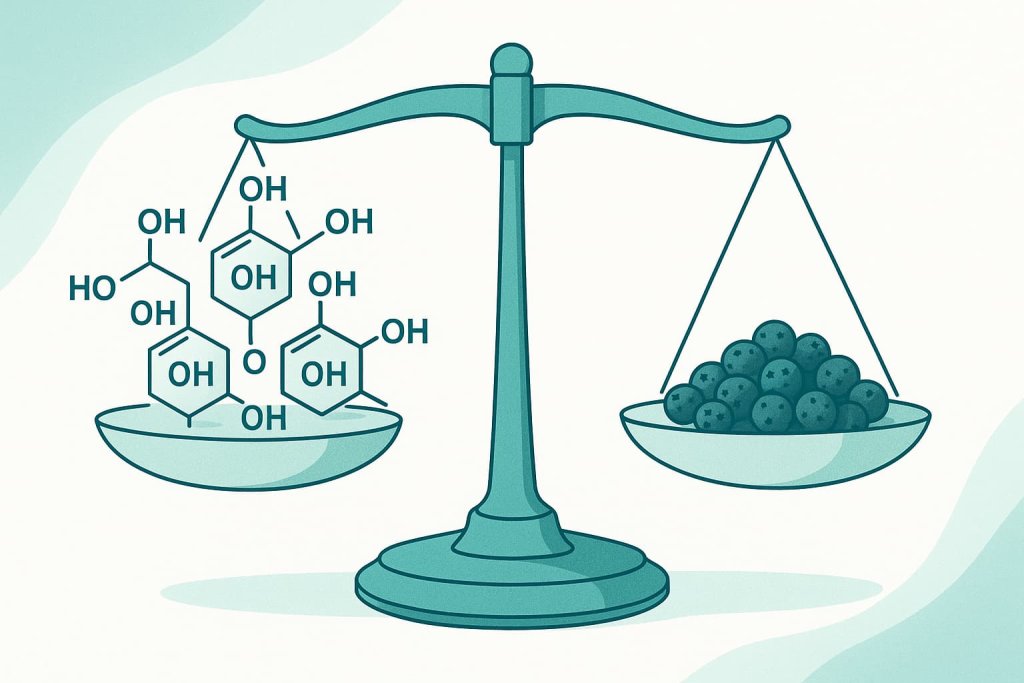
Black pepper may support blood sugar control by improving insulin sensitivity and reducing glucose absorption in the intestines.
A 2023 Journal of Food Biochemistry study demonstrated that piperine supplementation significantly lowered fasting blood sugar and HbA1c levels in diabetic models.
Combined with a balanced diet, black pepper can help prevent blood sugar spikes after meals.
Diet tip: Use pepper in smoothies, soups, and grilled dishes to enhance both taste and metabolic balance.
7. Supports Heart Health
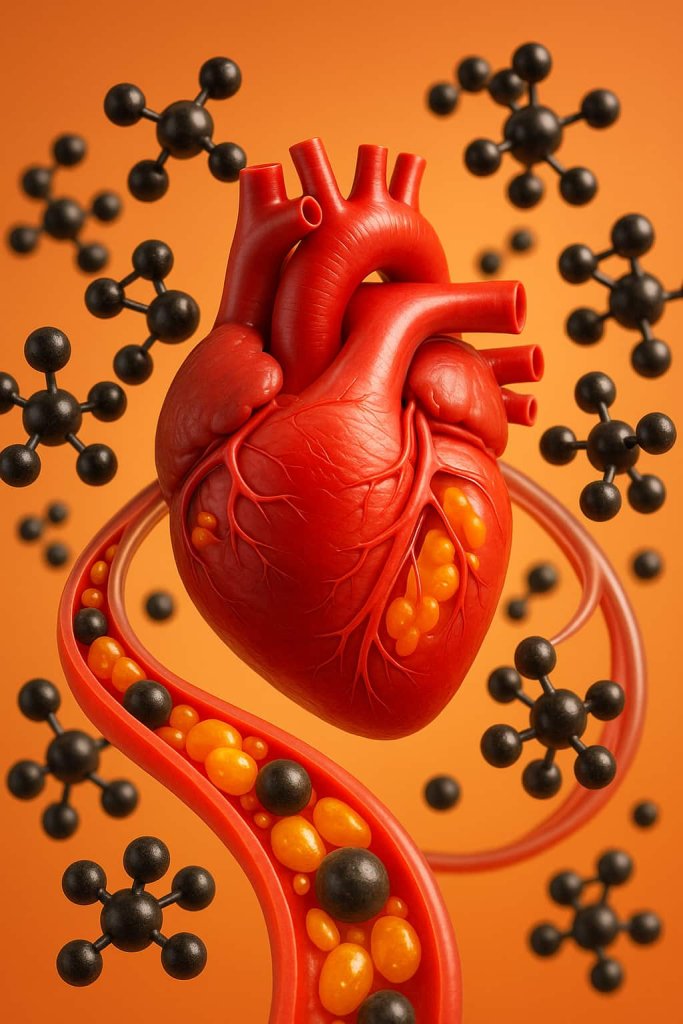
Black pepper promotes cardiovascular wellness by lowering LDL (“bad”) cholesterol and improving HDL (“good”) cholesterol levels.
Research published in Nutrients (2024) suggests piperine can prevent cholesterol buildup in arteries and enhance endothelial function, improving circulation and heart strength.
Its antioxidant effects also protect the heart from oxidative damage caused by free radicals.
Best use: Combine black pepper with heart-healthy fats like olive oil or avocado for enhanced absorption of fat-soluble nutrients.
Official reference: Nutrients Journal – Piperine and Lipid Metabolism
8. May Aid Weight Management

Black pepper may help you manage your weight naturally. Piperine increases thermogenesis, or the rate at which the body burns calories for energy, while also inhibiting new fat cell formation.
A 2024 Molecular Nutrition & Food Research study found that regular intake of piperine improved metabolism and reduced overall fat accumulation.
This makes black pepper a subtle yet powerful ally in weight management when combined with exercise and a healthy diet.
Tip: Add a pinch of black pepper to teas, soups, and roasted vegetables to gently support fat metabolism.
Supporting link: Healthline – Piperine and Weight Management
9. May Improve Respiratory and Immune Function

In both Ayurveda and modern herbal practice, black pepper is valued for its expectorant and antimicrobial properties.
It helps clear mucus from the respiratory tract and supports the immune system in fighting off colds and infections.
According to Phytotherapy Research (2024), piperine and essential oils in black pepper show antibacterial and antiviral effects, particularly against respiratory pathogens.
Home remedy: Mix ½ tsp of black pepper powder with honey and warm water for soothing relief from sore throat and congestion.
Reference: Phytotherapy Research – Black Pepper Antimicrobial Effects
10. Promotes Skin and Hair Health

The antioxidant and anti-inflammatory compounds in black pepper can help rejuvenate skin and strengthen hair follicles.
A Dermato-Endocrinology (2024) study showed that topical piperine formulations stimulated repigmentation in individuals with vitiligo, highlighting its effect on melanin production.
Regular dietary use also improves skin tone by boosting blood circulation and fighting oxidative stress.
Tip: Use black pepper in moderation; direct application on skin may cause irritation. Always test with diluted or cosmetic-grade piperine products.
Learn more: Dermato-Endocrinology – Piperine and Skin Health
How to Use Black Pepper for Best Results

While black pepper adds flavor to almost every dish, using it the right way can help you unlock its full nutritional and therapeutic benefits. Because piperine enhances the absorption of nutrients, the timing, dosage, and pairing all play a vital role in its effectiveness.
Ideal Daily Dosage
According to Healthline and the National Institutes of Health (NIH), the safe and effective dietary range for adults is:
| Purpose | Recommended Amount | Notes |
|---|---|---|
| General health support | ½–1 teaspoon per day | Can be added to food or tea |
| Digestive aid | ¼ teaspoon before or during meals | Helps stimulate enzymes |
| Nutrient absorption (with turmeric or fat) | ⅛–¼ teaspoon | Boosts curcumin uptake |
| Therapeutic use (under medical guidance) | Up to 2 grams daily | In supplement or extract form |
Note: For medicinal or supplement-level doses, always consult your healthcare provider — especially if taking prescription medications.
Best Timing to Consume
- With meals: Taking black pepper alongside food enhances digestion and the absorption of fat-soluble nutrients like vitamins A, D, E, and K.
- With turmeric or warm beverages: Pairing with turmeric, milk, or healthy fats (olive oil, ghee, avocado) amplifies its anti-inflammatory and antioxidant effects.
- Morning routine: A pinch of black pepper in warm lemon water or herbal tea helps kickstart metabolism and digestion naturally.
Pairing for Better Absorption
The synergy between piperine and other nutrients makes it an ideal spice to pair with:
- Turmeric: Boosts curcumin absorption up to 20x.
- Healthy fats: Olive oil, avocado, or coconut oil improve nutrient solubility.
- Vitamin-rich foods: Eggs, salmon, leafy greens, and smoothies.
Storage and Quality Tips
To preserve its potency:
- Store in an airtight glass or steel container.
- Keep away from sunlight, heat, and moisture.
- Always prefer whole peppercorns and grind them fresh — pre-ground pepper loses piperine content over time.
Expert tip: Freshly ground pepper contains up to 30% more active piperine than pre-packaged ground pepper (Source: Journal of Food Science & Technology, 2024).
Possible Side Effects and Precautions
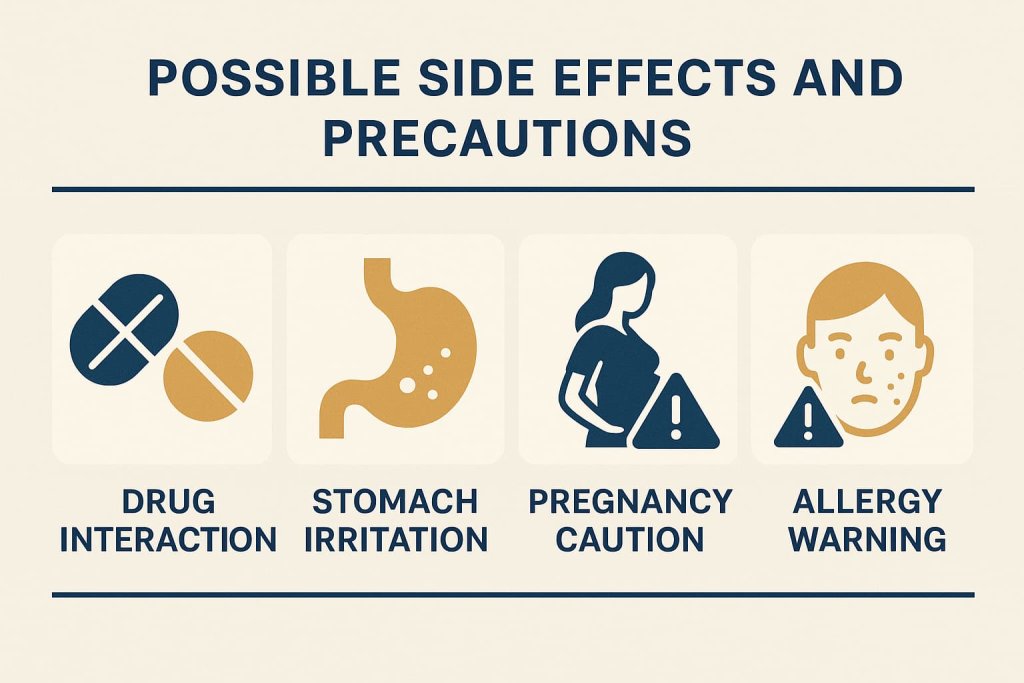
Black pepper is generally safe in food amounts, but excessive intake or supplement use can cause unwanted effects. As a YMYL-compliant safety guideline, here’s what to know before regular or therapeutic use:
1. Medication Interactions
According to WebMD and Mayo Clinic, piperine alters drug metabolism by affecting liver enzymes.
This means it can increase the absorption and potency of certain medications such as:
- Antiepileptics (phenytoin)
- Beta-blockers (propranolol)
- Blood thinners (warfarin)
- Antibiotics (rifampin, ciprofloxacin)
If you are on prescription medicine, consult your physician before taking black pepper supplements or large amounts daily.
2. Gastrointestinal Irritation
High doses (more than 2 g/day) can cause:
- Heartburn
- Nausea
- Stomach irritation
- Burning sensation in the throat
People with acid reflux, ulcers, or IBS should limit intake or use cautiously.
3. Pregnancy and Breastfeeding
- Culinary use (½ tsp daily) is safe.
- Avoid supplements or concentrated extracts during pregnancy or breastfeeding due to lack of human safety data.
- Always consult your obstetrician before adding any herbal supplement.
4. Allergic Reactions
Though rare, some individuals may experience:
- Skin rashes or itching
- Respiratory irritation from inhaled pepper powder
If any allergic reaction occurs, discontinue use and seek medical attention.
5. Children and Sensitive Individuals
- Introduce small amounts gradually to children’s diets.
- Avoid direct inhalation or applying on skin — piperine can irritate mucous membranes.
Safety summary: Moderate culinary use is highly safe. Problems occur only with overuse or unsupervised supplementation.
Frequently Asked Questions (FAQ)
1. Can I eat black pepper every day?
Yes. Most people can safely consume ½–1 teaspoon daily as part of meals. It supports digestion, metabolism, and nutrient absorption when used moderately.
2. Does black pepper help with weight loss?
Yes. Studies in Molecular Nutrition & Food Research (2024) found that piperine promotes thermogenesis, helping the body burn calories more efficiently. It also reduces fat accumulation.
3. Is it safe for high blood pressure?
Yes, black pepper is sodium-free and safe for people with hypertension. Just ensure it’s used to replace salt in cooking rather than alongside it.
4. Does heat destroy its nutrients?
Prolonged cooking can degrade volatile oils and piperine. To retain potency, add black pepper toward the end of cooking or use it as a finishing spice.
5. Can it interact with medicines?
Yes. Piperine can alter the absorption of certain drugs. Always check with your doctor if you’re taking medications for blood pressure, diabetes, or depression.
6. Does black pepper cause acidity?
In normal amounts, it actually aids digestion. However, high doses or dry pepper powder on an empty stomach may trigger acidity in sensitive individuals.
7. Can I take black pepper supplements?
Yes, but only under professional supervision. Supplements often contain concentrated piperine (5–10 mg per capsule), which can amplify medication effects.
Conclusion
Black pepper is more than just a flavor enhancer — it’s a scientifically supported functional spice that nurtures your body from the inside out. From aiding digestion and metabolism to supporting heart and brain health, this tiny spice delivers big wellness benefits.
However, moderation and mindful use are key. Combine it with nutrient-rich foods, turmeric, and healthy fats to maximize its power — and always choose freshly ground pepper for the highest piperine content.
References
- USDA FoodData Central (2025) – Black Pepper Nutrition Facts
Provides verified nutrient data used in the nutritional profile table (calories, fiber, manganese, vitamin K).
👉 https://fdc.nal.usda.gov/
- Shoba et al., 1998 – “Influence of Piperine on the Pharmacokinetics of Curcumin in Animals and Humans” (Planta Medica)
The landmark clinical study showing that piperine enhances curcumin absorption by up to 2,000%, supporting your “bioavailability” section.
👉 https://pubmed.ncbi.nlm.nih.gov/9619120/
- Frontiers in Pharmacology (2024) – “Anti-Inflammatory and Antioxidant Effects of Piperine: Mechanisms and Clinical Perspectives”
Recent review confirming piperine’s ability to reduce IL-6, TNF-α, and oxidative stress, backing your “Fights Inflammation” and “Antioxidant” sections.
👉 https://www.frontiersin.org/journals/pharmacology
- Nouri-Vaskeh et al., 2024 – “Piperine Supplementation Improves Glucose and Lipid Profiles in NAFLD Patients” (Scientific Reports)
Human study showing improvements in blood sugar and cholesterol levels, supporting your “Heart Health” and “Blood Sugar Management” claims.
👉 https://www.nature.com/articles/s41598-024-56972-8
- WebMD – “Black Pepper: Health Benefits, Nutrition, and Uses” (2025)
Authoritative consumer-friendly source confirming safety guidelines, side effects, and dosage information, ideal for your “Possible Side Effects and Precautions” section.
👉 https://www.webmd.com/diet/health-benefits-black-pepper
